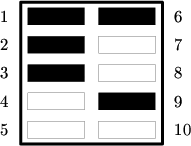Difference between revisions of "1988 AIME Problems"
Diophantient (talk | contribs) (Adding the problem) |
Diophantient (talk | contribs) m (→Problem 2) |
||
| Line 7: | Line 7: | ||
== Problem 2 == | == Problem 2 == | ||
For any positive integer <math>k</math>, let <math>f_1(k)</math> denote the square of the sum of the digits of <math>k</math>. For <math>n \ge 2</math>, let <math>f_n(k) = f_1(f_{n - 1}(k))</math>. Find <math>f_{1988}(11)</math>. | For any positive integer <math>k</math>, let <math>f_1(k)</math> denote the square of the sum of the digits of <math>k</math>. For <math>n \ge 2</math>, let <math>f_n(k) = f_1(f_{n - 1}(k))</math>. Find <math>f_{1988}(11)</math>. | ||
| + | |||
[[1988 AIME Problems/Problem 2|Solution]] | [[1988 AIME Problems/Problem 2|Solution]] | ||
Revision as of 12:53, 27 March 2007
Contents
Problem 1
One commercially available ten-button lock may be opened by depressing -- in any order -- the correct five buttons. The sample shown below has ![]() as its combination. Suppose that these locks are redesigned so that sets of as many as nine buttons or as few as one button could serve as combinations. How many additional combinations would this allow?
as its combination. Suppose that these locks are redesigned so that sets of as many as nine buttons or as few as one button could serve as combinations. How many additional combinations would this allow?

Problem 2
For any positive integer ![]() , let
, let ![]() denote the square of the sum of the digits of
denote the square of the sum of the digits of ![]() . For
. For ![]() , let
, let ![]() . Find
. Find ![]() .
.









